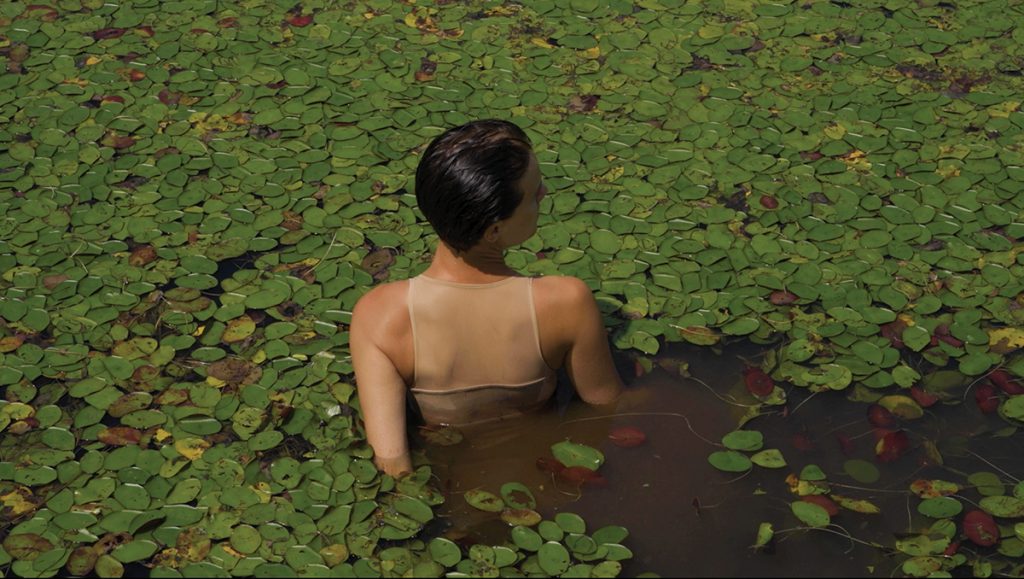
For 25 years, Kate Weare, whose work was described by Dance Magazine as “the voice of the ‘it’s complicated’ generation,” has been a highly acclaimed contemporary stage choreographer — Weare is a recipient of a Guggenheim Foundation Fellowship Award and a North Carolina Arts Council Fellowship — with her own NYC-based dance company. In 2018, she and her husband moved to Asheville to be closer to his family, and soon met Marshall, NC-based filmmaker and photographer Jack Sorokin — who often explores the human relationship to the land. Weare and Sorokin began experimental dance-film collaborations in 2019, and when the pandemic hit, unable to do live performances, Weare felt her desire to explore movement on film intensify.
Yet, she acknowledges, “It isn’t such an easy marriage — dance and film. With a live performance you’re in the animal body, but film removes it. Dance is a really warm-blooded medium, and I think film is a cold-blooded medium that objectifies the body. For a dance film to work, you need to somehow put the bodily connection back in.”
To capture such viscerally primal impulses, they immersed themselves in filming for 10 austere days in the summer of 2020, with Kate Weare Co. dancers Thryn Saxon and Nicole Vaughan-Diaz. “I slept in a cabin with no electricity in the middle of nowhere,” Sorokin recalls, “and the conditions added unfamiliar layers of complexity to the project.”
They chose remote locations in Polk and Madison counties — with most of the film shot in Mill Spring, on land owned by Weare’s mother-in-law. They edited in 2021 and in 2022 released Landfall, described as a “sensory fantasy of naturalism and a hallucinatory look at the human body in nature.” The film, which effectively provokes questions of whether humans belong in this natural world or are experiencing it more like alien outsiders, achieved unanticipated but well-deserved acclaim.
“We were just experimenting and had no idea what we’d do with it afterward,” admits Sorokin. “We had no script, no shot list, and it was a very run-and-gun process.” Nonetheless, Landfall has already won “Best Experimental Short Film” at the 2022 Paris Short Film Festival and “Best Cinematography” at the Experimental Dance and Music Film Festival in Toronto.
The camera lens points the attention where the directors want it to go, versus live performance where the audience controls where they look. So, while filming, Sorokin intentionally positioned the landscape as less of a backdrop and more like a character. At a red-clay construction site, he framed shots to remove visual references like the horizon — creating what resembles a mysteriously lunar terrain.
Meanwhile, Weare specifically zeroed in on what she describes as a “not quite rightness” regarding how the performers fit into their environment. In one sequence a dancer, barefoot and vulnerably and thinly attired, dangerously climbs 20 feet into a large scratchy pine – using fear and discomfort as a sort of intuitive guidance.
“What modern dance does so effectively,” reveals Weare, “is trace the reality of sensations inside our bodies that speak to us about survival, emotions, and our animal intelligence. There’s a logic inside the body which can be very powerful, and if we tune in to that there is enormous wisdom.”
A free public screening of Landfall — followed by a Q&A session with the filmmakers — will be held Thursday, May 12, 6-7pm at the Madison County Arts Council building (90 South Main St., Marshall (madisoncountyarts.com/events/landfall-film-screening/). On Thursday, May 19, the film will run at the same location on a continuous loop as an installation piece from 5-8 pm, coinciding with “Marshall’s Third Thursdays” events. For more information, visit jacksorokin.com/landfall-2021 and kateweare.com.